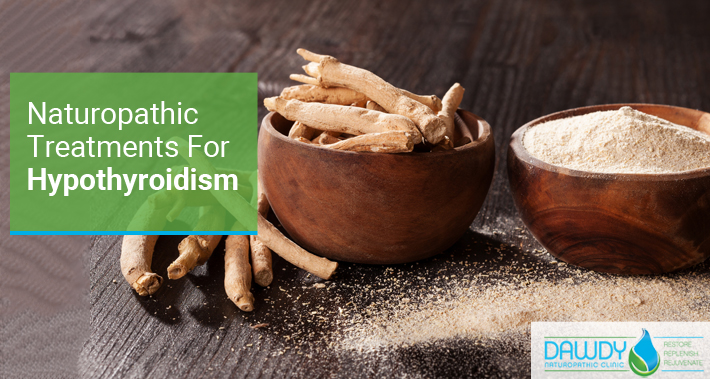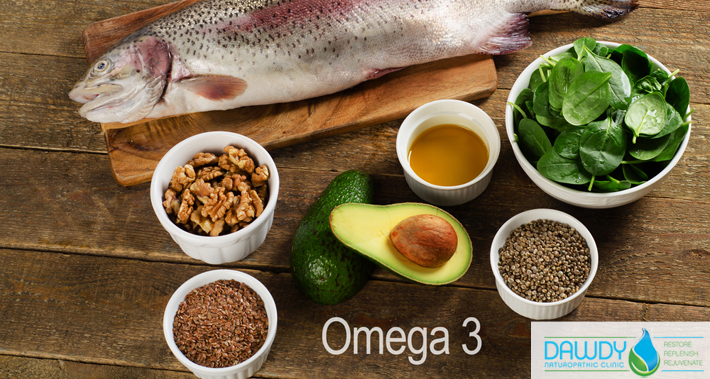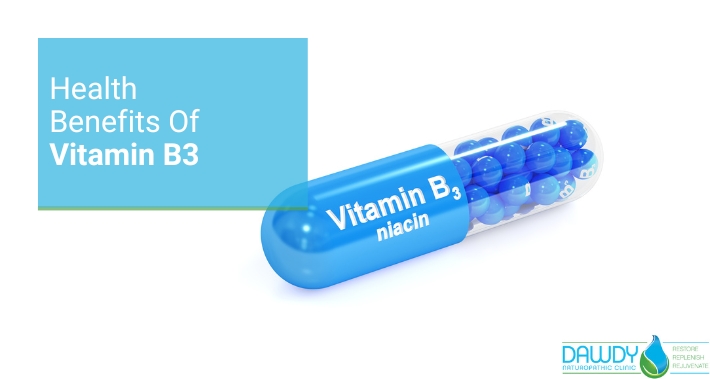Naturopathic Treatments For Hypothyroidism
Your thyroid is a small gland found in front of your windpipe.
It is shaped like a small butterfly and is a vital part of your endocrine system.
This means that it produces hormones that your body needs to function.
Hypothyroidism occurs when your thyroid doesn’t create enough thyroid hormones, leading to all sorts of unpleasant symptoms.
But, hypothyroidism is something that can be supported with naturopathic treatments.
As a thyroid naturopathic doctor in Ottawa, I’m here to help.
If you’ve been diagnosed with hypothyroidism, or you suspect you have it, book your appointment at Dawdy Naturopathic today.
Or, keep reading to find out more about hypothyroidism.
What is it, how to tell if you have it, and how naturopathic medicine can help.
What Is Hypothyroidism?
Hypothyroidism is a condition where your thyroid isn’t able to produce the appropriate amount of hormones your body needs.
This becomes a problem because your body needs thyroid hormones to control a number of vital functions.
This includes your digestive system and the rhythm of your heart beat.
It also controls your body temperature, and how much protein your body can generate.
A thyroid hormone deficiency can mean issues with all of the above.
Hypothyroidism is a common condition, and the risk factor for developing it increases when you pass the age of sixty.
How Do You Know If You Have Hypothyroidism?
You’ll need to have a blood test to confirm if you have hypothyroidism.
You might catch this as part of a routine checkup, or you may have one ordered if you begin to feel symptoms.
These symptoms can be different for different people, even if they all point to hypothyroidism.
An early form of hypothyroidism is called subclinical hypothyroidism.
If you have this, the first symptoms you may notice will probably be fatigue and unexpected weight gain.
As the condition progresses, other symptoms you may develop are:
- Depression
- Slowed pulse
- Feeling abnormally cold
- Dry skin
- Decreased sweating
- Dry and thinning hair
- Muscle weakness
- Joint pain or stiffness
- High cholesterol
- Constipation
- Memory loss
It’s important to note that these symptoms are also more common as you age.
This is why you’ll need a blood test to confirm your suspicion that your thyroid is the culprit.
RELATED: Symptoms Of A Hormone Imbalance
What Causes Hypothyroidism?
There are many different possible causes for hypothyroidism.
Some are more common and some are rarer.
The most common cause of hypothyroidism is called Hashimoto’s thyroiditis, which is an autoimmune response.
This means that your body’s immune system attacks the healthy tissue of your thyroid.
This damages your thyroid and reduces its ability to function.
Other common causes of hypothyroidism include anything that directly impacts your thyroid health.
Some examples are having thyroid surgery, radioactive iodine treatment, radiation therapy, certain medications, and iodine deficiency.
Rare causes of hypothyroidism include pituitary gland disorders, congenital disease, De Quervain thyroiditis, and pregnancy.
Let’s take a closer look.
Pituitary Gland Disorders
Your pituitary gland is another important part of your endocrine system, like your thyroid.
It’s responsible for creating different hormones that affect how your body functions.
You can think of it as the command centre for your hormones.
As a result, it controls and affects every other part of your endocrine system.
Anything that affects your pituitary gland can also affect your thyroid.
These include:
- Tumours
- Brain radiation therapy
- Sheehan syndrome
- Opioid misuse
This is an example of secondary hypothyroidism because it’s your pituitary gland that’s affecting your thyroid, not a problem with your thyroid itself.
Congenital Disease
Some people are born with either no thyroid at all, or an underdeveloped thyroid.
This is called congenital hypothyroidism and can be caused by genetics or iodine deficiency while in utero.
RELATED: Naturopathic Support For Expectant Parents
De Quervain Thyroiditis
De Quervain thyroiditis is caused by an upper respiratory tract infection that damages your thyroid cells.
You can catch it most commonly during the fall and summer months.
But, the hypothyroidism caused usually by this lasts between two and eight weeks.
It’s only in extremely rare cases that it’s permanent.
Pregnancy
If you’ve given birth, there is a small chance that you may develop postpartum thyroiditis.
This will manifest several months after you’ve given birth and can be either permanent or temporary.
The risk factor for this is greater if you have type 1 diabetes, a history of postpartum thyroiditis, or thyroid peroxidase antibodies in your blood.
Naturopathic Solutions For Hypothyroidism
There are many great naturopathic solutions for hypothyroidism depending on the cause of your condition.
This is because hypothyroidism is complex, and it’s important to be aware of the potential for interaction or side effects even when changing your diet.
That’s why it’s best to do so under the supervision of your naturopathic doctor, who can recommend the best course of action that works for your body.
That said, here are some general naturopathic approaches to hypothyroidism that may help.
1. Get More Omega 3 Fatty Acids
The most common cause of hypothyroidism is Hashimoto’s thyroiditis, which is an autoimmune disorder.
Recent studies have indicated that omega 3 fatty acids can reduce the inflammation that adversely affects your thyroid function.
This is especially helpful if you have an autoimmune disorder, because your goal will be to reduce the amount of inflammation in your body.
They can lower LDL (bad) cholesterol and improve your body’s ability to coagulate blood.
Getting more omega 3 fatty acids in your diet can help to reduce symptoms of depression, brain fog, and dry skin or hair as well.
2. Get More Iodine
Iodine is the necessary ingredient for your thyroid to produce the right amount of hormones for your body.
Not having enough is actually a cause of hypothyroidism.
Eating a balanced diet will ensure you’re getting enough day to day, without necessarily having to rely on a supplement.
Iodine deficiency is much rarer than it used to be, thanks to the addition of iodine to salt in the modern diet.
That’s why we call it “iodized salt.”
But at the same time, you might be looking to reduce your salt intake because of another health condition.
Thankfully there are other good sources of iodine beyond salt.
Other food sources of iodine include:
- Eggs
- Seafood
- Seaweed
- Dairy products, like milk, yogurt, or cheese
RELATED: Can Healthy Eating Be Affordable? Yes!
3. Get More Selenium
Selenium is helpful for supporting efficient thyroid synthesis and metabolism.
It does this by activating your thyroid hormones, making it easier for your body to use them.
Selenium is an essential nutrient and antioxidant, which helps to protect your thyroid from damage at the cellular level.
It has also been found to reduce thyroid antibodies in people with Hashimoto’s thyroiditis.
A selenium deficiency is a common nutrient deficiency associated with hypothyroidism.
Foods rich in selenium include:
- Fatty fish
- Eggs
- Brazil nuts
- Legumes
4. Take Ashwagandha
Ashwagandha is an adaptogenic herb that may be helpful for improving thyroid function if you have subclinical hypothyroidism.
Adaptogenic herbs help your body to balance and regulate metabolic processes.
But, there are possible side effects depending on the cause of your hypothyroidism.
Ashwagandha can stimulate your body’s immune response, and so if your hypothyroidism is an autoimmune disorder like Hashimoto’s thyroiditis, you should not take it.
5. Get More Zinc
Zinc can help you to improve your thyroid function and hormone levels, in a similar way that selenium does.
It makes your thyroid hormones more readily available for your body to use and is another common deficiency associated with hypothyroidism.
Foods high in zinc are shellfish, beef, chicken, and whole grains.
6. Avoid Thyroid Interfering Foods
Finally, after considering all of these healthy foods to add to your diet, there are some foods to avoid because they interfere with or your thyroid function.
Naturally, it’s a good idea to avoid processed sugar and other junk foods.
These foods will trigger inflammation in your body.
You’ll also want to avoid goitrogens, which interfere with your thyroid’s ability to function.
You can find goitrogens in soy based products like tempeh, tofu, and edamame.
You can also find them in starchy plants and fruits like strawberries, sweet potatoes, peaches, and cruciferous vegetables like kale or cauliflower.
It’s okay to have some of them, unless you have an iodine deficiency.
If you’re not sure how much is too much, your naturopathic doctor will evaluate your symptoms and provide you with a tailored recommendation.
But most of those are considered healthy foods!
This is why hypothyroidism can be a complex disorder to deal with.
And it’s why if you suspect you have it, it’s a good idea to…
Book Your Appointment With Dr. Kimberly Dawdy, ND, Today
There are many natural therapies that can help to ease your symptoms and address the underlying cause of your hypothyroidism.
I’m Dr. Kimberly Dawdy, naturopathic doctor in Ottawa, and I can help.
Book your appointment with me, Dr. Kimberly Dawdy, ND, today.
Yours in Health,
Dr. Kimberly Dawdy, ND
Dawdy Naturopathic Clinic
6899 Sunset Blvd,
Greely, ON K4P 1C5
-https://g.page/dawdynaturopathicclinic
Dawdy Naturopathic Clinic offers a variety of naturopathic health solutions for individuals and families in Ottawa and the surrounding area.





